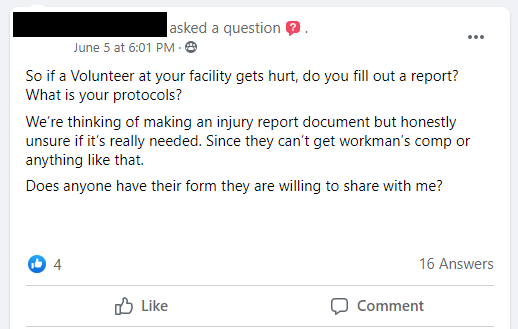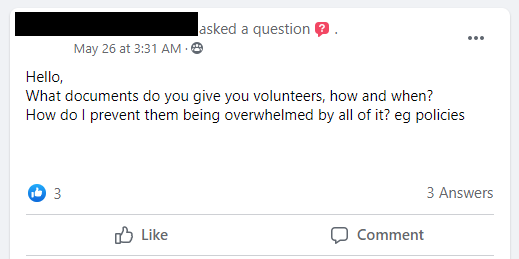Recap for May 24th - June 6th
This week we are covering 2 weeks of content from our volunteer coordinator resource community! Some of the most popular topics include volunteer incident reports, minimum age requirements for volunteers, and processes for volunteer paperwork.
Incident Reports
There was a great conversation last week regarding protocols for injuries that occur while the volunteer is on-site. While many organizations are likely to have a process for documenting employee incidents, volunteers may be overlooked in these policies. Even if volunteers aren’t eligible for the same benefits, it can be valuable to document any issues or injuries and keep a copy for your records. Make sure to communicate this process with your volunteers so they know how to access the form and provide documentation after an incident.

Comments about volunteer incident reports
“Always better to document. Get their version in writing and any witnesses. I am at an animal shelter so we are usually talking about animal bites so we also take photos for a variety of reasons.”
“I’m in Australia. We record all incidents as the volunteers are covered under the Volunteer Accident Insurance. If the injury warrants a trip to the hospital or results in an infection, then it is also reported to Worksafe Australia as required by law.”
“Yes we fill out an accident report and actually at my hospital they are covered under workman's comp. I get an email from HR once a year asking how many active volunteers we have.”
“We fill out the same report that we fill out if an employee gets hurt just identify them as a volunteer. We do cover them under workmans comp but even if we didn’t, it’s good to have a report and surveillance camera footage saved of what happened in case they tried to come back and file a claim or sue.”
“Have a form. Fill it out for anything that needs more than a couple bandaids. This way you don't forget questions you should ask and have a record of the answers. For example, we ask if they want us to contact emergency services. 99.9% of the time they say no, but the written record is important.”
“We do incident report for volunteers in the same way we would for paid employees”
Check out all of the comments here!
Minimum Age for Volunteers
When it comes to volunteering, certain opportunities may be better suited for older volunteers. The minimum age for volunteering will likely be influenced by the type of organization, available volunteer roles, and staff supervision. Family volunteer days and youth opportunities are great ways to introduce younger children to volunteering, but they may not be the best fit for organizations with confidentiality requirements, higher risk projects like construction, or independent volunteer experiences.

Comments about minimum age requirements
“They have to be at least 16 years old to volunteer independently, and 7-15 years old to volunteer with an adult (1:1 ratio at all times). We are an animal shelter!”
“16-year-olds can volunteer independently, and those 13-15 must be accompanied by an adult. Any younger than that and we would have to do a lot of correcting the volunteers' work. Even the 13-15-year-olds aren't always ideal, but they are typically part of a group. So, we accept the lesser quality work to offer the group experience and have our name and mission circulated.”
“Ages 16~ 18 depends on the job, but can volunteer independently if qualified. Ages 10-15 with a parent only and only certain jobs. No one under 10.”
“Also make sure you are in accordance with any laws around confidentiality. Our volunteers have to be over 16 because that's when the states says they can understand confidentiality”
“We take ages 14 plus so students can start earning their required community service hours sooner than later. We welcome all ages as a family unit; we’ve had a couple of toddlers run around making everyone smile!!”
Volunteer policies and paperwork
When new volunteers join the organization, there is typically a certain amount of paperwork that needs to be reviewed and completed. While it may feel daunting, it is generally a crucial step to ensure volunteers understand your organization and the commitment involved with becoming a volunteer. Depending on your intake process, you may include this paperwork as part of the application, orientation, or their first day volunteering.
If you have a lengthy training process, you may consider giving them relevant paperwork in batches so they can review it during each step of the training process. Some organizations may also find it useful to organize documents digitally so volunteers can access it from anywhere instead of only having a paper copy.

Comments from others
“I handle all paperwork and policies during training (pre-covid), and now after training. Our training class is 36 hours so I have found it is helpful for me to wait until after training so I’m. It running paperwork on people that decided to volunteer elsewhere.”
“In this round of volunteer training, instead of giving them a huge stack of paper, we've given them access to a Google drive that has everything in it. Our training is seven sessions long, and we'll let them know each session about relevant info in the folder as we go. The feedback has been that this doesn't seem too daunting and is nice to have for access. Nice on our end too as it means we can easily swap out or add things as necessary without worrying about who has what versions. We also have the drive broken down into folders so relevant info is easier to find. I've worked enough places where I spent hours putting together binders only to have almost nobody ever look at them……..”
 Written by
Written by